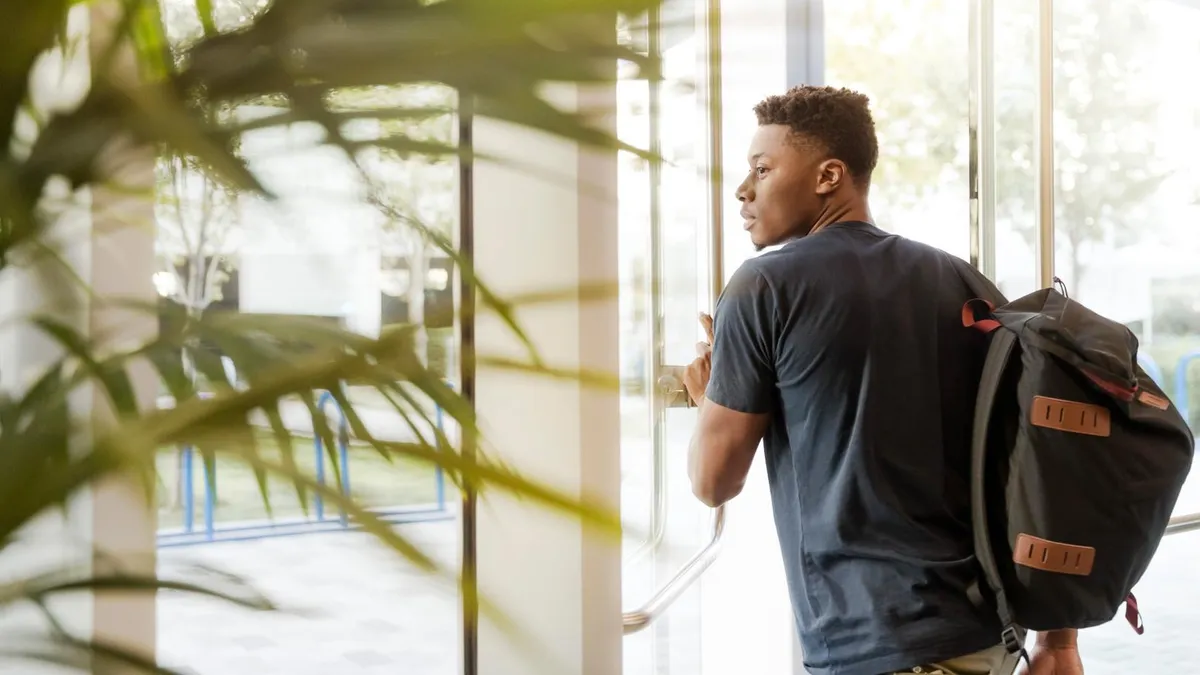Dive Brief:
- One in five high school students responding to a recent survey said they will likely not attend college next year because of the coronavirus. A slightly smaller share said the situation may cause them to attend a different college than they planned.
- The survey, conducted by consulting firm SimpsonScarborough, looks at how the pandemic is influencing the college plans of high school seniors and college students.
- Already, colleges have moved their spring recruitment efforts online, and they expect more competition than usual to lock down their fall enrollment.
Dive Insight:
The survey is based on responses from 573 high school seniors who, prior to March 1, were planning to attend a residential four-year college in the fall. The firm also polled 513 college freshmen, sophomores and juniors who were enrolled at four-year residential institutions prior to March.
Of the high school seniors who had already decided the college they would attend in the fall, 14% said it was likely they would change their mind as a result of the pandemic.
Students who had not yet picked a college were more likely to say the coronavirus situation will factor into their choice. One-third said the outbreak is influencing their decision and nearly one-fifth said their top choice school had changed as a result.
The share of high school students whose college decisions are in flux is relatively small compared to those who say their choice is not, or that they don’t yet know how it will be affected.
Still, college officials were gearing up for a competitive recruitment season before the coronavirus hit, and the health crisis has only raised those stakes, admissions experts have told Education Dive.
Many schools are pushing back the typical May 1 deadline for students to accept admissions offers, and a key admissions industry group effectively greenlighted colleges to recruit students who already committed to an institution. As the economic impact of the virus swells, colleges also may need to promise students additional financial support — a recruiting tool many were already leaning on.
Students opting out of four-year colleges could dent those schools' revenues. About one-quarter of students who have submitted their deposit "can be considered 'at-risk' for changing their minds," the report's authors explain. Eleven percent of those who were planning to attend a four-year school are now looking at alternatives, including a two-year or online college or not attending at all. Their absence, they add, "could be enough to create dramatic revenue shortages at many colleges and universities."
Of high school seniors who have decided on a college, 40% surveyed said they are not receiving "adequate information" from their college pick about how the coronavirus will affect their enrollment.
At least half of students polled said that, if offered, they would participate in a live video chat with faculty in their major (50%), watch a video of campus life (57%), attend a virtual campus tour (64%) or observe an online class (64%).
Communication with existing students is also important, the authors note. Of the current college students polled, more than 40% said their opinion of their school has worsened since the outbreak. And 63% said the online instruction they are receiving as a result of campus closures is worse than in-person courses.
Some disappointment may be unavoidable as colleges were forced to adapt, in a matter of days, courses originally designed to be delivered in the classroom or laboratory. Particularly for programs that involve hands-on learning, instructors have had to make significant changes to how they teach.
Still, 86% of the college students polled said they planned to return to the institution for the fall term. That’s compared to the national average of 81% for first-time, full-time undergraduates at four-year schools in 2016. And just over one-quarter said their view of their school has improved.










